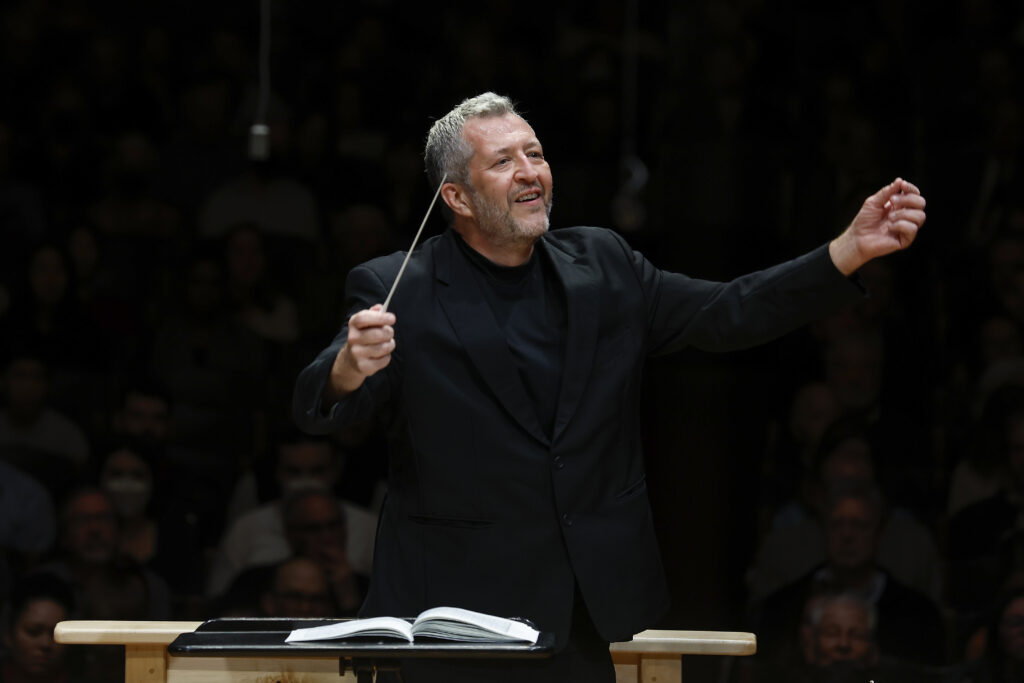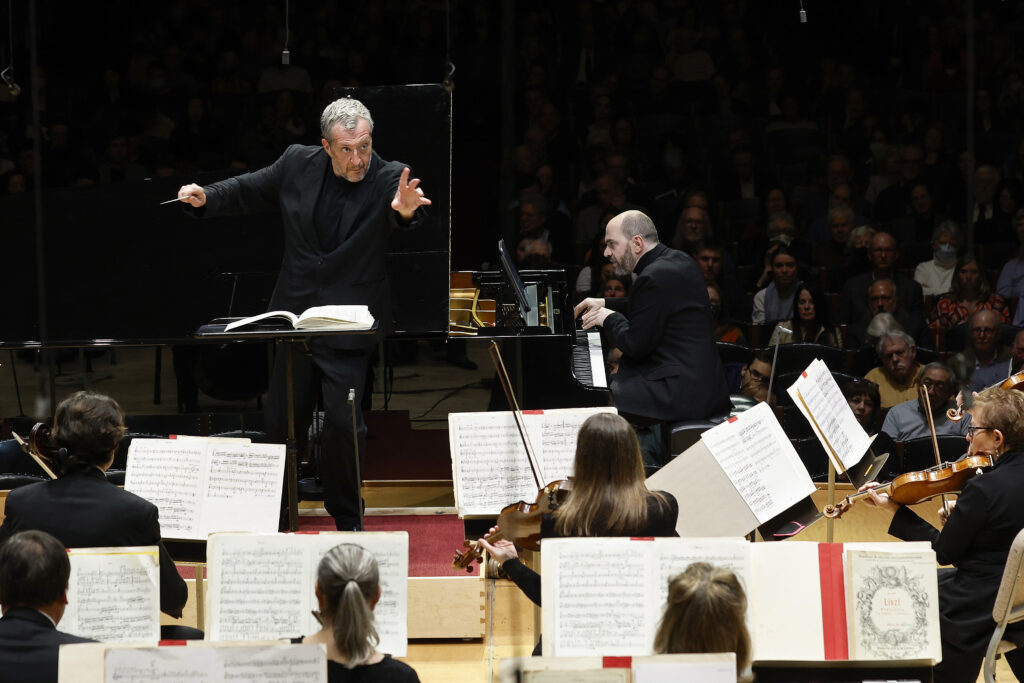“Tevot” and Ligeti concerto reveal new musical worlds with Adès and BSO

Thomas Adès conducted the Boston Symphony Orchestra Thursday night at Symphony Hall. Photo: Winslow Townson
Whenever Thomas Adès comes to town to conduct the Boston Symphony Orchestra, it’s an open question what will be more absorbing: his program–which is invariably one of the season’s most thoughtful and revelatory–or the specific composition of his that is getting (usually) its local premiere.
Such was the situation again Thursday, when the British composer-conductor-pianist made his annual stand with the BSO at Symphony Hall. Like last time, Adès’ own work–here Tevot–won out. But the competition, such as it was, was fierce.
Part of the reason was the sheer novelty of the night’s offerings: of four selections, two were BSO premieres. The other two hadn’t been played by the orchestra in Boston since, respectively, 1986 and 2002.
The former item was ostensibly the evening’s most familiar, Franz Liszt’s symphonic poem Les Préludes. From the flexibly phrased, smartly balanced account in which Adès led the orchestra Thursday, one would never have guessed it wasn’t a BSO staple.
Indeed, in this Préludes, the beautifully blended woodwind contributions and Jessica Zhou’s fluent harp playing were the embodiment of discretion and taste. At the same time, the bold, martial episodes didn’t want for swagger or excellent dynamic shape
By curious coincidence, the last time the BSO played Les Préludes at Symphony Hall, György Ligeti was in the process of composing his Concerto for Piano and Orchestra.
Begun in earnest in 1985 and completed in 1988, the score was the first of three concertante works for various instruments written over the last twenty years of the iconic Hungarian composer’s life. This one takes as its departure point a perplexing and seemingly incongruous combination of influences, from African drumming and player pianos to fractal geometry and the art of M. C. Escher.

Kirill Gerstein performed György Ligeti’s Piano Concerto with Thomas Adès and the BSO Thursday night. Photo: Winslow Townson
To say that it sounds like nothing else in the canon is to state the obvious. Yet Thursday’s performance—the local debut of the concerto and the centerpiece of the orchestra’s weeklong “Ligeti 100 Celebration”—managed to uncover more than a few surprising reference points among the score’s hyper-abstracted textures.
There were, in the first and third movements especially, several seeming echoes of jazz and dance. The Lento’s wailing gestures sang with heartrending urgency. Periodically, the shadow of what might have been a folk song crossed the stage.
These touchstones, combined with Kirill Gerstein’s brilliant account of the stupendous solo part, helped one make more sense of this strange, knotty work. Playing with incisive clarity and astonishing fluency, Gerstein anchored the night’s reading with security and feeling.
Particularly compelling was the pianist’s embrace of the music’s rhetorical and gestural aspects. In these–the second movement’s study of sonic space, disintegration, and contrast, for instance, and the third’s transformation of falling lines–Gerstein was consistently gripping.
So were Adès and the BSO.
The conductor coordinated the whole enterprise with a sure hand, ably illuminating the music’s architecture and teasing out an accompaniment of real character and color from a reduced contingent. The ensemble reveled in the music’s Ivesian climaxes as much as in its unexpected turns of sonority, like the finale’s duet for piano and xylophone and the Vivace cantabile’s burst of harmonica.
Despite a huge orchestra, there’s less instrumental spontaneity–and no harmonica–in Igor Stravinsky’s Orpheus. An adaptation of the Greek myth written for George Balanchine’s Ballet Society (now New York City Ballet) in 1947, the score is steeped in the composer’s neo-classical syntax.
Certain spots are inspired. The opening and closing scenes are moving. The music for the Bacchantes is ferocious and concise. Orpheus’ “Pas de deux” with Eurydice is simple, pure, and beautiful. Other sections–like the “Dance of the Angel of Death” and the Second Scene’s “Pas d’action”–are less so.
Regardless, Thursday’s reading, the BSO’s first in 21 years, largely impressed. True, Orpheus’ ostinato-driven episodes took some time to settle.
But concertmaster Alexander Velinzon’s vigorous solos in the First Scene were gracefully limber. Harpist Zhou made numinous work of her figurations throughout (and especially in Scene Two). And the nobly processing “Apotheosis of Orpheus” proved enchanting.
The night’s unforgettable installment, though, was of Adès’ Tevot. Written for the Berlin Philharmonic in 2006, this twenty-minute-long essay is a symphony in all but name.
Conceptually, Tevot is straightforward: its materials transform through various states of density and unclarity over the first half. In the middle, a simple melodic figure emerges under a halo of chords. This theme is gradually taken up by the whole orchestra as the harmonization passes into the depths of the ensemble. Eventually, everything comes to rest on an iridescent, A-major triad.
Thursday’s account, led by the composer with a compelling sense of direction, overflowed with rhythmic energy and a bracing sense of space. Adès’ mesmeric command of musical structure was riveting: everything in Tevot seemed to come into focus just when and as it should.
Throughout, the BSO’s played with thrilling exactitude. The massed episodes packed wallops, but they were always balanced, never shrill. What’s more, the score’s contrapuntal apotheosis, with its myriad melodic lines orbiting one another like planets around the sun, sang with astounding clarity.
The effect was akin to looking in on a newly discovered universe, at once fresh, strange, and hypnotic–yet also vaguely recognizable. Just as in the Ligeti, the indescribable takes on auditory form and, fleetingly, becomes comprehensible.
The program will be repeated at 1:30 p.m. Friday and 8 p.m. Saturday at Symphony Hall. bso.org
Posted in Performances